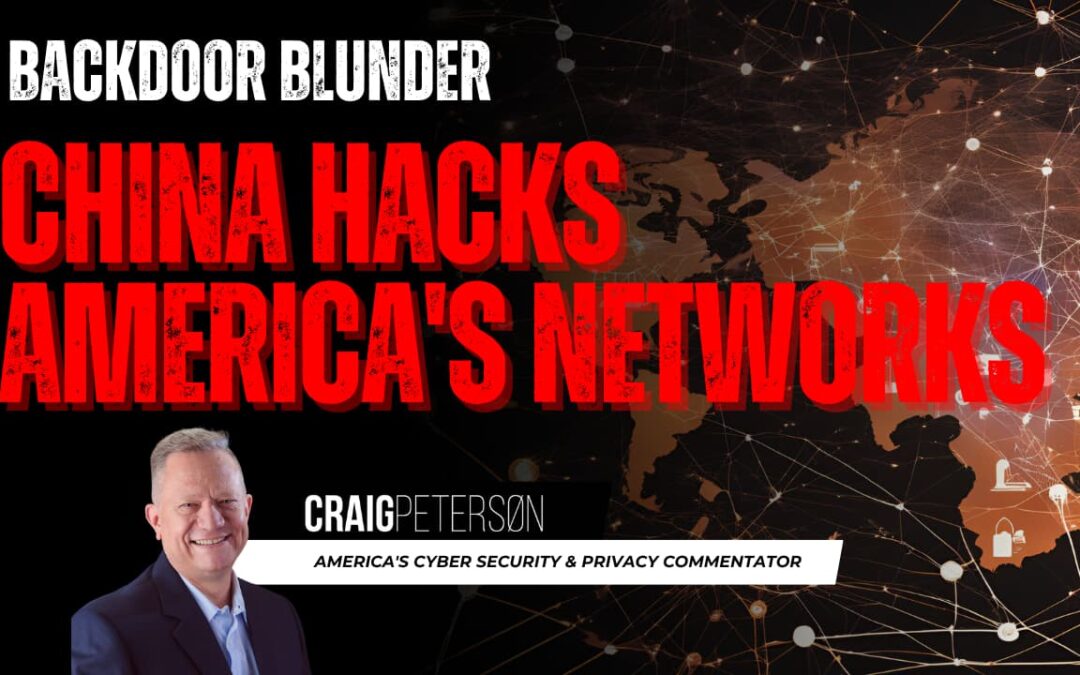Buckle Up, Folks! Chinese Hackers Just Took US for a Wild Ride!
Governments all over the world have been trying to get tech companies to put backdoors into their systems for years. They want to be able to see what anyone is doing at any time 😱 Same is true in the United States, and I’ve been fighting against these types of regulations for decades because of unintended consequences. Apple has also pushed back on providing a backdoor into its systems, which has brought a lot of flak from governments around the world.
Now we’ve found out about a big backfire! Congress required that telephone companies provide an ever-ready backdoor to our communications that they would only use if they received a court order. Hmm. An open backdoor that they could use at will. Turns out that it wasn’t just our law enforcement that decided to use this (apparently) wide-open backdoor.
📜 CALEA: The Law That Opened Pandora’s Box 📜
Let’s rewind to 1994, when the Communications Assistance for Law Enforcement Act (CALEA) was born. This well-intentioned law aimed to make life easier for our brave law enforcement officers by requiring telecom providers to build in a little “backdoor” for legal wiretaps. Sounds great, right? Well, hold onto your hats because this is where the plot thickens! 🎩
🐉 Enter the Dragon: Chinese Hackers Crash the Party 🐉
Fast forward to the present day, and we’ve got a doozy of a situation on our hands. It turns out that some sneaky Chinese hackers, probably backed by their government, decided to crash the party and exploit the very same backdoors that were meant for our own law enforcement. They waltzed right into the networks of big-name internet providers like AT&T, Verizon, and Lumen, potentially gaining access to a treasure trove of sensitive data and communications. Yikes! 😨
And this wasn’t the first time! Two decades ago, a significant cybersecurity incident occurred that highlighted the vulnerabilities inherent in mandatory wiretapping capabilities. In Greece, hackers successfully exploited this system, which was intended for lawful interception, to gain unauthorized access to highly sensitive communications. The breach allowed these malicious actors to intercept phone conversations of numerous high-ranking officials, including the country’s Prime Minister, as well as key figures in politics, law enforcement, and the military. 🎭📞
🔓 The Backdoor Dilemma: When Good Intentions Go Awry 🔓
Now, here’s the kicker: security experts have been warning us for years that there’s no such thing as a backdoor that only the “good guys” can use. It’s like leaving a spare key under the doormat and expecting only your trusted neighbor to find it. In the digital world, any intentional security weakness is an open invitation for hackers, foreign adversaries, and cybercriminals to come snooping around. 🕵️♂️
🌉 The Fallout: A Cautionary Tale for the Ages 🌉
The consequences of this breach are still unfolding, but one thing is crystal clear: legally mandated backdoors can have disastrous effects on our national security. By requiring telecom providers to intentionally weaken their defenses, CALEA may have inadvertently rolled out the red carpet for our digital enemies. It’s a hard lesson to learn, but one that we can’t afford to ignore. 📚
🔒 The Case Against Government-Mandated Backdoors 🔒
This incident serves as a powerful argument against government-mandated backdoors in encryption and security technologies. It’s a stark reminder that when we trade security for convenience, we’re playing a dangerous game that can backfire in spectacular fashion. We need to prioritize the integrity of our digital infrastructure and resist the temptation to create “master keys” that can fall into the wrong hands. 🗝️
🚀 Onward and Upward: Securing Our Digital Future 🚀
So, what’s the takeaway from this wild ride? It’s time to get serious about cybersecurity and rethink our approach to balancing privacy, security, and law enforcement needs. We need to invest in stronger encryption, better security practices, and more robust defenses against foreign hackers. It won’t be easy, but the alternative is leaving ourselves vulnerable to even more catastrophic breaches down the line. 💪
Oh, and Apple was right. No Backdoors!
There you have it, folks! The tale of how Chinese hackers took Uncle Sam for a joyride and exposed the risks of government-mandated backdoors. It’s a wake-up call for all of us to stay vigilant, demand better security, and work together to protect our digital lives. Stay safe out there, and remember: in the world of cybersecurity, sometimes the best defense is a strong offense! 🛡️ 💻


